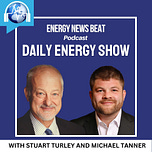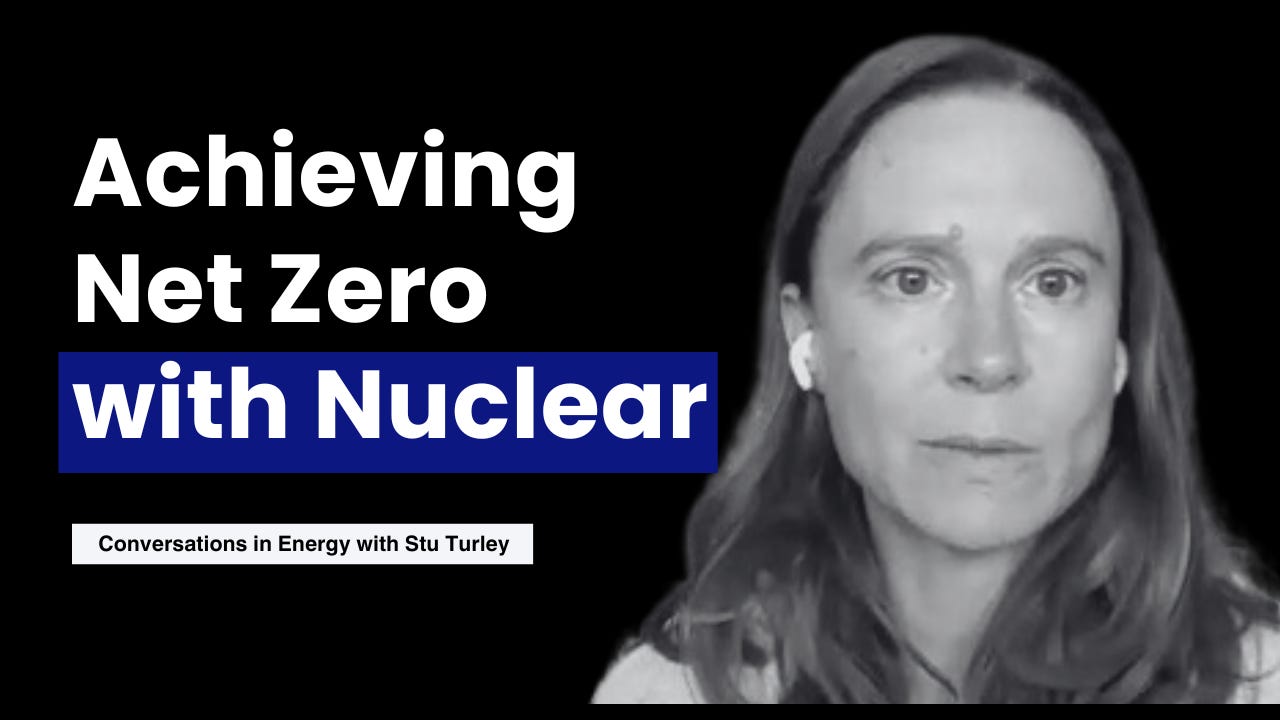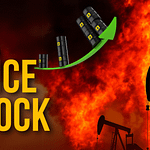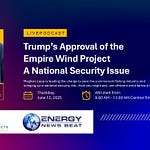In the Energy News Beat, Conversation in Energy with Stuart Turley interviews Elizabeth Muller, Executive Chair and Co-Founder, about the future of nuclear power and the challenges surrounding nuclear waste disposal. They explore public perception shifts, the potential for recycling nuclear waste, and regulatory barriers in the US compared to Europe. Elizabeth highlights Deep Isolation's innovative underground disposal method and emphasizes the need for legislative changes to advance nuclear power as a key component in achieving net-zero emissions.
Check out Deep Isolation Here: https://www.deepisolation.com/
Connect with Liz on LinkedIn HERE: https://www.linkedin.com/in/elizabethmuller/
We need nuclear power more now than ever in our nation's history. Nuclear and natural gas are the only ways to achieve Net Zero while balancing the grid demands. I had a blast visiting Liz; her expertise and company are great examples of what we need to get things moving to achieve significant low cost and low pollution in the United States.
Thank you, Liz, for stopping by the ENB podcast. I look forward to the updates! Let me know if we can coordinate a podcast with our elected officials to help move forward. - Stu
Highlights of the Podcast
00:00 - Intro
01:00 - Elizabeth’s New Role
02:13 - Public Perception of Nuclear
03:32 - Recycling Nuclear Waste
04:00 - Waste Disposal Challenges
06:38 - Regulatory Hurdles
08:31 - Optimism for Nuclear’s Future
09:48 - European Progress vs. US Barriers
12:23 - Deep Isolation’s Solution
16:42 - Legislative Challenges
19:31 - Future of Nuclear Power
20:01 - Contact and Closing
The following is an automated transcript that may be edited for grammar.
Stuart Turley [00:00:07] Hello, everybody. Welcome to the Energy News Beat podcast. My name is Stu Turley, President and CEO of the Sandstone Group. I'll tell you what. We are in a complicated energy world right now. In order to get to net zero, we're going to have to have all forms of energy on deck and operating smoothly. And I've got a fantastic guest to come up and visit with us about nuclear energy and the waste problems coming around. I've got Elizabeth Muller and Liz as Executive Chair and Co-Founder of Deep Isolation. Welcome. Thank you for stopping by the podcast.
Elizabeth Muller [00:00:47] Thank you so much, Steve. Really excited for our conversation.
Stuart Turley [00:00:50] Well, you've got some great news. You're now a board member and you've now handed the reins of your other company off. Tell us about this. This is exciting news.
Elizabeth Muller [00:01:01] I have, and it's a tremendous moment of pride and humility as well as you recognize that, first of all, your company may not need you as much as it once did. And, you know, creating something that can live without you. I mean, I guess it must feel the same when your kids sort of go off and become successful adults. And it's wonderful. And it also feels a little bit humbling and a little bit of a loss, too, at the same time. So lots of big emotions.
Stuart Turley [00:01:28] Well, as you're going through a change here, you know, it's kind of like an empty nester. You're now being pushed out of the nest, I think, in a great way.
Elizabeth Muller [00:01:38] So yeah, it's very exciting.
Stuart Turley [00:01:40] But one of the things that I was noticing is we're getting ready for this, podcast. Was your article on LinkedIn that you had shared out a few days ago, and I thought that was pretty impressive. You know, we've got Diablo Canyon in California providing a ballpark of 10% of the power for California. And there is we need more nuclear. But you made it as we were getting ready and visiting about this, there's a real problem with why people are anti-nuclear. Can you go into a little bit about your thoughts on that?
Elizabeth Muller [00:02:13] Yeah. So the public perception of nuclear power is shifting and it has been shifting over a number of years now. So we are getting to the point where more and more Americans are supportive of nuclear power. And this is largely because of climate change. And so whereas 15 years ago, people were concerned about different things. Today, climate change means that we need clean, secure, low cost energy. And nuclear is now sort of back in the mix in people's minds as something that they recognize that we need. Now, for those people who don't support nuclear power, and even for those who so many of those who do support nuclear power, there's still this overhanging. What about the waste and and yeah, that nuclear waste is compact. It's small. It's very safe where it's stored today. So so I don't want to minimize that. And that is true. But at the same time there is no disposal solution for for nuclear waste, for spent nuclear fuel or high level nuclear waste today, anywhere in the world. Nobody has ever disposed of this stuff. And that is a personal frustration of mine, because we all know where it needs to go. And there's even a consensus on on how to do that. We just haven't been able to successfully take action on actually disposing of it.
Stuart Turley [00:03:32] Wouldn't it seem to be a wonderful thing to be able to use it in thorium reactors, or actually use the waste from one reactor and use it in another reactor? That, to me seems like a great thing that we could do around the world. We could power and get rid of energy poverty if we actually use it in thorium reactors, and using the molecules out of the waste in other reactors.
Elizabeth Muller [00:04:00] Yeah, there's there's a lot of different feelings on that. So there's, there's a bunch of people who are very supportive about recycling and reusing spent nuclear fuel. And there's a lot going for that argument. It is a source of power potentially, and it is, you know, helping to minimize the risk that exists today. On the other hand, there's other people who think that it might make more sense economically to bring in new fuel. Not you don't really want to touch this stuff, you don't really want to get married. And so there's the and there's potentially some risk of proliferation if you were to do this. So it's a it's a controversial subject I think it doesn't you know personally I'm neutral on it. I think we can go either way. But whichever way you go you're still going to need a waste disposal solution. So the waste if you do want to recycle or reprocess, you're going to want to use new fuel or rather recent spent nuclear fuel. You're not going to want the old stuff that's been sitting there for, for 30 or 40 years. And so that stuff is still going to need a disposal solution. And. As you reprocess and recycle, you're also going to generate waste. And so that's still going to need a solution. So it it changes the form factor a bit. But it doesn't really solve the issue of you still need a waste disposal solution.
Stuart Turley [00:05:15] O outstanding points. Those are those are fabulous. I was about a year and a half ago. I interviewed Thomas Jam. He's the CEO of Copenhagen Atomics, and that loved what they were doing with their thorium reactors and their their waste byproducts and things. And when you take a look at how that all comes about, it's about getting the lowest kilowatt per hour to everyone on the planet with the least amount of impact on the environment. Yeah, that seems like a very easy thing to say, but pretty complicated in trying to deliver it when we're facing this. And it is fun to see the nuclear resurgence and saying, you know, if we're if if people, Liz are clamoring for net zero, I don't think we're going to get to net zero. Now that I is surface, I pretty much effectively killed the net zero, in my opinion. And that's because now people or the data centers are just clamoring for more and more energy. And in order to get to the net zero goals, to get to the EVs that are being, you know, mandated and those things, we have to double the grid that we're going to do in the next ten years. It took us a hundred years to get here. I don't know if we can make it.
Elizabeth Muller [00:06:38] Yeah, I guess I'll have a little bit more optimism than you would. I would say, I don't know if we could do it without nuclear, but I think with nuclear power, I think we do have the potential to, to do this. And I'll maybe I'd go ahead.
Stuart Turley [00:06:50] But we don't have we have zero big nuclear reactors on the blocks right now. Zero. We have three grid reactors that are in the approval process, and one of them being at Texas Christian as a an entry level one. We've got to get out of the great way and turn our nuclear folks loose if we're going to make it as far as that goes, because the government is in the way it seems.
Elizabeth Muller [00:07:16] So I agree that we're going to need to move really, really quickly. I think that's completely true. I also excited by the passage of the Advance Act just last month, which is now directing the regulator to think about the benefits of nuclear power in addition to the safety of nuclear power. So we're yet to see exactly what the impact is going to be. And the regulator has been, you know, I think thinking about this and moving in the direction of efficiency for a long time, the advanced reactor companies, there's a lot of them. I mean, I think there's there's a lot of companies that are ready to go as soon as we enable and empower them to do so. And so there are still issues that need to be fixed. But I think I'm I'm pretty optimistic about where things are going to go in the next 5 to 10 years.
Stuart Turley [00:08:01] I am more of an optimistic than I had been even six months ago, even eight months ago. So I, I, I think this is phenomenal. I think that the bridge though is, is fixing the regulatory issues, and we're going to see a lot of natural gas power plants come online that don't need to. If we went straight to nuclear, and I really think we should try to muscle our way into that nuclear space.
Elizabeth Muller [00:08:31] Personal opinion. Yeah, yeah. No, I completely agree. And the other thing that I think so sort of bring this back to the nuclear waste issue, you know, so California, for example, which you mentioned earlier, is not allowing any new nuclear power in the state until the waste problem is solved. So there are a dozen or so states in the US that are saying no new nuclear power until we've solved the nuclear waste problem. So this is also a opportunity for us to take advantage of new innovations in solving for nuclear waste disposal, to solve that problem, and to help enable the growth of new nuclear power.
Stuart Turley [00:09:06] Wow. I'm sitting here thinking, but defining the waste is going to be interesting because when you say a no new nuclear until the waste problem is solved is going to be a pretty big one. Because as Liz, as we bring this up, new uranium as you come in and this waste topic is critical, I would rather though my use my old waste rather than buy uranium from Ukraine. Right now we currently buying 20% of our new uranium. Or is it 2,222% of our uranium is Russian? I think something like that. Why are we supporting Russia with that?
Elizabeth Muller [00:09:49] Yeah, and I think there's many people who feel the same way as you do what the regulations state is. So it's not so much that they say that the waste has to be recycled or can't. Be recycled. I think there's some flexibility in that or there will be some flexibility in that. But as I mentioned earlier, if you recycle or reprocess, you still have waste that needs to go into the disposal. So recycling reprocessing does not get away from the need for a disposal solution. And that's that's what we, I think need to solve in order for California and other states to be able to have a future for nuclear power.
Stuart Turley [00:10:25] I sure hope people look to you as a resource and the experts, because when we're writing those regulatory issues, if we take something like the Copenhagen Atomics or the other companies that are using other nuclear spent waste and turning it to a non radioactive byproduct, that waste platform is going to be easier to get through. And so, you know, when you take a look at yes, you're going to have that waste there. I hope that just because it doesn't it comes out of a nuclear reactor. It's not going to get put into the other one over here and then get tied up over there. So hopefully some sanity can come out of this if that makes sense.
Elizabeth Muller [00:11:07] Yeah it does. And to be clear, Europe I think is thinking ahead of the US on this. So the the EU has moved forward. Their new taxonomy says that new nuclear power will be considered green if it comes with a waste disposal solution. So yay. That's great. That's, that's as it should be. And if.
Stuart Turley [00:11:26] It comes nice.
Elizabeth Muller [00:11:28] It comes with a waste. And so we're seeing governments in Europe and companies in Europe that are looking to build new nuclear power now have an incentive to figure out the waste disposal solution in a way that they hadn't been required to before. In the US, however, we're still in a bit of a bind. So in the US, unfortunately, there is a law that says that all nuclear waste must go to Yucca mountain and Yucca mountain is. There's currently no plans to ever open it. It's not being built, it's not being developed. And yet no other waste disposal solutions can be considered until Yucca mountain is operational. So we are in a bit of a bind here in the US, unlike Europe, that is able to to move forward more comprehensively.
Stuart Turley [00:12:15] That to me is horrific. I can understand I mean so deep isolation, what does deep isolation do for this waste product.
Elizabeth Muller [00:12:23] From deep isolation is providing a method for disposing of nuclear waste. That is where everyone agrees. It needs to be so deep underground, where it can't be touched by hurricanes or or armies or anyone. And we're doing this by bringing together new technology out of the oil and gas sector, specifically around directional drilling. So nuclear waste, as many of your listeners probably know, is remarkably compact. You know, people talk about how little nuclear waste there is because you compare it to coal or anything else, and it really is remarkably little waste if you take advantage of the fact that it is so dense and you can put it down an 18 inch borehole a mile underground and seal it up, and this is very safe and you don't need people underground. So this is the difference of what deep isolation is proposing, as opposed to a big underground mine repository that has air and people and means you can't go as deep because you need to maintain those air and safety for, for for the people in the workers underground.
Stuart Turley [00:13:27] That is incredible. Now, would you put the the material in a casket or of coffee is some kind of seal? Because I could just see the questions rolling around on this and saying, oh, by the way, oh, it's going to get into the water tables.
Elizabeth Muller [00:13:45] Yeah, yeah. So it's there's an interesting answer, which is that when you are above the water table, there is potentially a risk that if something gets out of the container, it is it could eventually go down and get into the water table. When you are under the water table, it sort of depends on the depth there. Things will potentially migrate up through the rock, but very slowly. We're talking about my my migration through solid rock. So when you have a billion tons of rock that it needs to migrate through, you can calculate the speed of potential migration through that rock. And we're looking at time for periods of 1 to 1.5 million years for anything to migrate up to the potentially the water table, at which point it's no longer going to be dangerous. So these are calculations that we've done. We've model that out. And generally speaking, you can be safe enough for short periods of time when you're above the water table. If you're just slightly below the water table, you're going to need a lot of engineering work in order to make sure that nothing can get out and potentially get up to the water table. But when you're a mile underground or a kilometer underground, you can calculate the. That really the, the the container itself. So the canister that we're, we're using is not an essential piece of the protection. It's really the rock that you're using to guarantee that nothing ever gets up and into the water table.
Stuart Turley [00:15:14] This is really cool because now what kind of developments have been done to seal the hole? Because normal cement does not last nearly as long as they're a new kind of sealant technology that you're looking at.
Elizabeth Muller [00:15:30] Yeah. So there are lots of different types of seals that can be used. Again, when you're looking at a relatively shallow repository, the seal is is quite important. And then there's been work that's been done on on sealing for shallow mind repositories when you're looking at again, sort of a kilometer to three kilometers underground, you and you don't put anything in the vertical shaft. So all of their waste is either at the bottom in the sort of lower the deepest part if you're in a vertical borehole or if you're in a horizontal borehole, you just lay it out horizontally in the directional drilled part and then you seal the vertical shaft. So you're talking about a kilometer of sealant, and it makes the the material that you use for the sealant less important because there's so much of it. And so even if it does migrate through it a little bit, it'll migrate up and get dispersed, migrate up, get dispersed, and you find that nothing gets to the top of the surface or the water table.
Stuart Turley [00:16:30] Wow. I'll tell you, this is actually very cool. How do we get you in front of Congress to get extra money, since they're handing their printing money like nobody else's business these days?
Elizabeth Muller [00:16:42] Yeah, no, it's a it's a great question. And I think that Congress is recognizing the importance of nuclear waste disposal. The the barrier is that we are going to have to amend the Nuclear Waste Policy Act. So this is not a light lift. This is a heavy lift. Now, there are places where deep isolation and others could potentially start that are in more of a gray zone. So new nuclear power, for example, is that the waste is not necessarily destined for Yucca mountain. From some of the research and defense facilities, the waste is not necessarily dedicated to to Yucca mountain, but for all commercial reactors that operate in the US today, their waste has been declared by the Nuclear Waste Policy Act that it is going to Yucca mountain now. The Department of Energy was supposed to collect it by 1998, and that didn't happen. And now there's no real expectation that it's going to be starting up again. But until that Nuclear Waste Policy Act is changed, no alternatives can be and can be developed. And that is a challenge.
Stuart Turley [00:17:48] Wow. This is amazing. And and so you step and you're now the chairman of the board there. And and so are you going to take this opportunity to go train and visit with the legislature and the government to try to focus on this, as opposed to your day to day activities that you used to do?
Elizabeth Muller [00:18:11] Yeah. I think what we really need is we need a win. We we need a example that we can point to. So before we get up into Congress and we say, you know, believe us, this is safe enough, we need to point to someone, somewhere in the world where we've done this before. And so we're looking at opportunities, as I mentioned earlier, in Europe, where there is no significant barrier, there is no Nuclear Waste Policy Act equivalent. And so governments can move forward with waste disposal options. And we've been working with quite a few of them. And we're also looking at opportunities in the United States where we can prove this out for other types of waste. So for advanced reactor wastes or for defense and research waste.
Stuart Turley [00:18:53] Oh, this is actually very, very cool. I I'll tell you, this is one that I would really hope gets some traction because we are not going to make it to net zero without nuclear. We're not gonna make it without natural gas. And people do not like natural gas. In fact, unfortunately, Liz, coal is still king around the world. Coal? We're using more coal now than we did in previous years because people want power, electricity, and you're not going to get off of coal until we can fix nuclear.
Elizabeth Muller [00:19:32] You know, and you touched on earlier with the growth of AI and data centers, and there is this massive need for for new power. And I do think that we can get there with nuclear. I think it is the best chance for for getting there and to for doing it in a clean and secure and reliable way. But there are still some significant barriers to, to doing that that, that we need to overcome.
Stuart Turley [00:19:55] Wow. Well, this is exciting. How do people reach you in in trying. To get more information from you.
Elizabeth Muller [00:20:01] So deep isolation.com. We have a website. People are also free to email me directly. So I'm just Liz at Deep Isolation Xcom.
Stuart Turley [00:20:08] Oh, and I'm following you on LinkedIn as well.
Elizabeth Muller [00:20:12] So LinkedIn is also great.
Stuart Turley [00:20:13] You're out there so well. Thank you so much for stopping by the podcast today. And we will have all this in the show notes. And I'll tell you what, I want to have you back again as we get further down the road, because if there are any updates from deep isolation, I do want to get that out there to our listeners and everything else. So thank you so much.
Elizabeth Muller [00:20:35] Thank you Stu. This was a lot of fun and I'd love to come back. Thanks.















Share this post